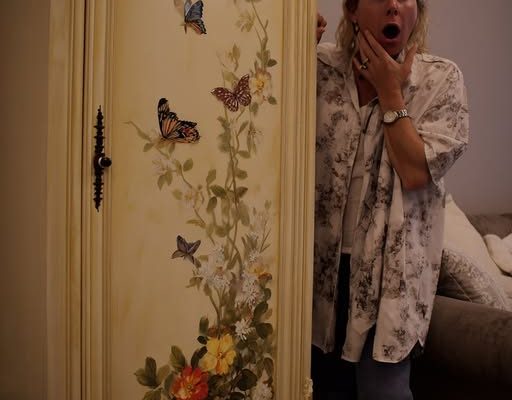Family drama doesn’t always announce itself with shouting matches or chaotic holidays. Sometimes, it arrives quietly—wrapped in a dusty piece of furniture and a phone call you wish you’d ignored. That’s exactly how my story began.
I’m Patsy, 30 years old, a part-time artist and full-time peacekeeper—at least, I was until my sister-in-law Vanessa finally pushed me over the edge.
It was a scorching Thursday afternoon, and I was halfway between prepping dinner and cleaning paint off my hands when the phone rang. Vanessa’s voice, sharp and urgent, cut through the noise.
“Patsy, I need this ugly junk out of my house. Today.”
Confused, I asked, “What junk?”
“That hideous armoire from Grandma Rose. It’s making my living room look like a thrift store. I’m having it delivered to your place. You’ll need to pay the movers, okay?”
My heart skipped. Grandma Rose’s armoire wasn’t just “junk.” She had been a warm, steady presence in my life—the woman who taught me how to make apple butter and held my hand during my first family Christmas. That piece of furniture was one of the last tangible things we had of her.
“Are you sure, Vanessa? That was—”
“I don’t care who it belonged to. It’s dark, ugly junk. Burn it if you want. Just take it.”
Her voice was firm, almost dismissive. There was a pause, and then she added, “And don’t make this weird. It’s just furniture.”
So, I agreed. Reluctantly.
But when the movers arrived, it was anything but “just furniture.”
The armoire looked as though it had weathered a storm. Its dark oak was nearly black, the once-beautiful carvings dulled by years of neglect. Hinges squeaked painfully. It leaned slightly, as if tired from decades of standing.
Daniel, my husband, found me later tracing its carvings gently, like reconnecting with a memory.
“You’re thinking what I’m thinking?” he asked.
I nodded. “She said I could do whatever I wanted with it. Let’s bring Grandma Rose back.”
Over the next few weeks, we poured ourselves into the restoration. Sanding every curve, replacing warped panels, searching hardware stores for antique brass handles. As the layers of grime lifted, a rich honey-colored wood emerged. The once-forgotten armoire began to glow.
Then came the real transformation. I painted it a soft buttercream, delicate roses and butterflies hand-painted across the doors in tribute to Grandma Rose. Each brushstroke felt like speaking to her spirit—telling her she was still remembered.
When it was done, I stepped back and gasped. It looked like something out of a fairy tale. Elegant, heartfelt, full of life.
Daniel wrapped his arms around me. “She would’ve loved this,” he said. “It’s beautiful.”
I couldn’t wait to show it off at his birthday gathering. Guests admired it, touching its edges, complimenting the details. But then Vanessa walked in—and everything changed.
She froze. Her coffee cup trembled. She walked slowly to the armoire, fingers tracing the roses. Her voice barely rose above a whisper: “My God… this is gorgeous.”
Pride welled in me—until she turned and said something that made the room go silent.
“I want it back.”
I blinked. “What?”
“I made a mistake. This is Grandma’s. It belongs to my family.”
Daniel stepped in, anger rising. “It’s our family. You gave it away.”
Vanessa waved him off and faced me. “Don’t be selfish, Patsy. It’s a family heirloom. It should go back to someone related by blood.”
That was the moment I broke.
“You can have it,” I said. “For $1,400. That covers the movers you made me pay for, materials, tools, storage, and every hour I spent restoring it.”
Her face turned red. “$1,400?! For some paint?”
“For the time. The care. The love,” I replied. “Try hiring someone else and see what it costs.”
“You’re holding my grandmother’s furniture hostage!”
“No,” I said calmly. “You threw it out. I made it into something beautiful. That makes it mine.”
The room filled with murmurs. Daniel’s mother turned away in disappointment. Even Vanessa’s usual supporters stayed quiet.
Vanessa hissed, “You’ll regret this,” before storming out.
Later that week, around 2 a.m., my phone buzzed with a motion alert. Groggy, I checked the porch camera—and nearly dropped the phone. There was Vanessa, dressed in black, struggling with a dolly, sweating and muttering.
“She thinks she can steal what’s mine? Not tonight.”
We watched in disbelief as she tried—unsuccessfully—to move the armoire. After nearly ten minutes of failed attempts, she stomped away, defeated.
By sunrise, I sent her the footage with a short message: “Next time you try the emergency key, remember—we have cameras.”
By noon, someone delivered our spare keys back. Vanessa blocked me on every platform.
Weeks passed. The armoire still sits in our living room, catching the sunlight, glowing softly. Sometimes I see Daniel trail his fingers along the painted roses, smiling quietly. We don’t talk about that night much—but we don’t need to.
Some family members say I should apologize, make peace. But I know better.
Vanessa didn’t want the armoire. She wanted control. She only saw its worth once someone else brought it back to life. But that’s not how family—or respect—works.
You don’t get to discard something, then demand it back once it’s beautiful again.
Not everything broken can be repaired. Not every relationship deserves a second chance.
But sometimes, the things others toss away can become treasures—if you’re willing to see their value and put in the work.
And that? That’s more meaningful than anyone else’s approval will ever be.



